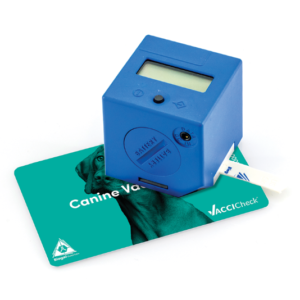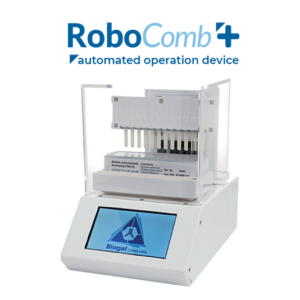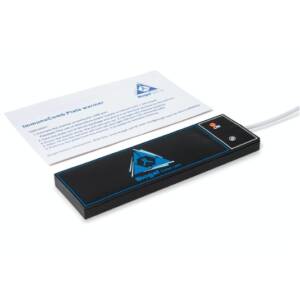A revolutionary product
The only in-clinic titer test kit that tests for all 3 core vaccine antigens and compares favorably with Gold Standards. VacciCheck is the only kit on the market approved for use by regulatory authorities such as USDA (USA), CFIA (Canada), Japan (MAFF) and others.
Superior quality
An in-clinic titer test, that obtains laboratory-grade results. Provides semi quantitative serological results simultaneously for the three core canine or feline diseases.
Easy to use, easy to interpret
Test individual patients for up to 12 samples at a time, in six simple steps. Obtain clear and scored results in just 23 minutes. Alternatively, batch test patients for greatest efficiency.

Highly affordable
VacciCheck provides you reliable information about your pet-patients’ immunology, without breaking the bank. Testing in-house is more cost effective than sending titer test samples off to a lab, making VacciCheck a leading effective and affordable serological testing solution
Expand the range of services provided in your practice
You can now handle your clients’ increasing awareness about the necessity of routine vaccination and possible side effects by recommending a titer test during the annual health check
Avoiding unnecessary vaccination has never been simpler, with VacciCheck.
What VacciCheck does (key test indications):
1-Confirm puppy/kitten immunity following completion of an initial core vaccination course
2-Manage disease outbreaks in animal shelters by enabling proper immunization
3-Establish the protection status of newly adopted adult dogs/cats with unknown core vaccination history
4-Assess adult dog/cat core disease immunity, enabling appropriate booster scheduling
Sampling:
5μL of plasma or serum, or 10μL of blood is used for testing
Canine VacciCheck Performance*:
INFECTIOUS HEPATITIS (IGG)
Specificity: 93% Sensitivity: 94%
PARVOVIRUS (IGG)
Specificity: 100% Sensitivity: 88%
DISTEMPER (IGG)
Specificity: 92% Sensitivity: 100%
Feline VacciCheck Performance*:
PANLEUKOPENIA (IGG)
Specificity: 89% Sensitivity: 98%
CALICI (IGG)
Specificity: 90% Sensitivity: 91%
RHINOTRACHEITIS (IGG)
Specificity: 93% Sensitivity: 96%
Test Time:
Results available in 23 minutes
Required skills:
Running the test is easy and does not require specific skills. Either you or your vet technician would be able to perform the test easily.
Registered in:
USA – USDA (2011)
Canada – Canadian Food Inspection Agency (2013)
Japan – Japanese Ministry of Agriculture, Food and Fisheries (2017)
*Data on File – Performance Reports:
A field and experimental trial to assess the performance of the ImmunoComb Canine VacciCheck Antibody Test Kit. Performance Report of ImmunoComb Feline VacciCheck Antibody Test Kit.
That’s where VacciCheck Quick Guide comes in. The guide offers veterinarians easily accessible information (4 simple steps) to confirm core disease immunity in dogs and cats.
Each VacciCheck kit contains12 individual tests that can be run one at a time or batch tested up to 12 at a time. A VacciCheck lab pack is available as well, which contains 120 tests.
VacciCheck should be kept refrigerated at 2-8 °C/26-46 °F when not in use and should be brought to room temperature prior to being used. Refer to the kit’s instructions for the appropriate acclimation time.
The test warm-up time before use can be reduced by using Biogal’s Platewarmer, for an automation development of the test RoboComb can be used and reading of results can be done by using, Biogal’s CombCam. For more information visit: www.biogal.com
The test requires a very small amount of blood: just 5μl of serum/plasma or 10 μl of whole blood.
Before testing, bring the sample to room temperature. Small vials usually require 10 minutes in room temperature before they are ready for use.
It is recommended you use fresh samples.
- Store whole blood at 2-8 °C/26-46 °F if the test is to be run within 1 day of collection. Do not freeze whole blood samples.
- Store serum and plasma samples at 2-8 °C/26-46 °F if the test is to be run within 3 days of collection. If the test is delayed more than 3 days, freeze samples to -20°C or colder.
- Bring samples to room temperature and mix well before testing.
Absolutely! some clinics will collect samples throughout the week and keep them refrigerated to run a batch test simultaneously. Each test is self-contained, meaning, if you run 4 tests at a time, the other 8 will still be perfectly fine as long as they remain sealed.
VacciCheck has a shelf life of 15 months from the day of production.
Once a kit has passed the expiration date, it can no longer be guaranteed for accuracy and should be properly disposed.
VacciCheck is anELISA-based test that requires the developing comb to be moved throughout the 6 rows and into each well, alternating between two and five minutes (please refer to the Instruction manual for further guidance).
Remember: Mixing by moving the comb up and down must be done in all wells.
The optimal mixing goes as follows:
During each incubation step, perform 2-3 mixing actions. Each mixing action includes moving the comb up and down 3-4 times. Reduce the excess liquid on a paper towel before you move to the next row. Any deviation in the operation of the test will affect the development of the test and the ability to interpret the results correctly. result correctly.
No. If the comb is stored in the dark, once the results have been developed, they won’t fade and can be kept on record.
If a test has been punctured, refrain from using it since future contamination may result in an inaccurate test result. Other sealed tests may still be used.
VacciCheck products need to be transported and stored at 2-8 °C or 26-46 °F.
All products were tested in accelerated extreme conditions to verify their resistance to short uncontrolled conditions that may occur during transportation.
During reasonable short-term transport (usually 24-72 hours) the kits can resist exceeding temperatures above the marked range and their quality, in general, will not be affected.
In some cases, a dark background in the comb might appear, which can be related to some of the following cases:
Suboptimal mixingHigh immunoglobulin contentSpecimens Abnormality For any inquiries/complaints, please fill the following link and submit your question. We will be happy to assist you.
The word titer is a way of expressing concentration, and titer testing is a way to measure the presence/concentration of antibodies in humans or animals’ fluid samples.
The purpose of titer testing is to determine protective immunity in puppies/kittens, to determine revaccination intervals in adult dogs/cats, and to manage infectious disease outbreaks in shelters.
It is extremely important to vaccinate dogs/cats in order to allow them to build immunity and fight diseases. However, due to a great variability in their ability to build their protection, and a great variability in the duration of immunity in each dog/cat, titer testing is the only available tool to help vets make a smart evidence-based decision regarding revaccination. By titer testing pets, vets can determine whether revaccination is needed or not and prevent possible vaccination side effects.
As recommended and defined by WSAVA Vaccination Guidelines every dog and cat are required to have core vaccines in order to protect them from life-threatening infectious diseases that remain prevalent throughout the world. These include the following vaccines.
- Canine core vaccines:
- Infectious canine hepatitis (ICH)
- Canine parvovirus
- Canine distemper virus
- Feline core vaccines:
- Feline panleukopenia virus
- Herpesvirus- feline viral rhinotracheitis (FVR)
- Feline calicivirus
Non-core vaccines are only required of animals whose geographical location, local environment or lifestyle place them at a risk of contracting specific infections. Most of these animals require an annual boost.The Parainfluenza virus, Bordetella bronchiseptica, and Leptospira, for example, are classified as noncore vaccines.
VacciCheck is a simple and affordable titer test, designed to monitor an animal’s immunity status as a result of vaccination, in order to confirm protectionand avoid unnecessary vaccination in immunized pets. A single blood test will assess a pet’s immune status for core feline or canine diseases.
VacciCheck measures antibody levels against canine core vaccines components (parvovirus, distemper, and infectious hepatitis), and against feline core vaccine components (panleukopenia, herpesvirus and calicivirus), in order to assess the pet’s immunization following vaccination.
Once your comb has been developed, gray dots will appear on it: a positive control dot and 3 test dots. The results are always relative to the positive control.
A score of 2 and above is considered positive, meaning the animal is protected.
The WSAVA Vaccination 2016 Guidelines state: “The presence of antibody (no matter what the titer is) indicates protective immunity and immunological memory is present in that animal. Giving more frequent vaccines to animals in an attempt to increase antibody titer is a pointless exercise. It is impossible to create ‘greater immunity’ by attempting to increase an antibody titer”.
“When antibody is absent, (irrespective of the serological test used) the dog should be revaccinated unless there is a medical reason for not doing so, even though some will be protected by immunological memory.”
Yes! VacciCheck is a semi-quantitative test and comes with a slide scale to match the gray dots on the developing comb with a correlating number. The darker the dot is, the higher the titer.
VacciCheck offers a CombCam for users who prefer an automated system to interpret results.
No, it does not. According to WSAVA, “monitoring serum antibody specific for canine rabies is not generally used in the same manner for determining re-vaccination requirements as these are mandated by law”.
According to the WSAVA guidelines a test should be performed every three years.
With that being said, it is recommended you test yearly in certain medical situations and in geriatric dogs/cats.
It depends on the facility’s requirements and policy.
The performance of the VacciCheck test kit has been validated using clinical samples by comparing results to the gold standard titer assays. The test was approved by the USDA and other authorities
We recommend following the WSAVA guidelines and test puppies/kittens 4 weeks after the completion of the puppy/kitten vaccination series.
Taking into account that Initial puppy/kitten vaccination is finished at 16 weeks or older, it is recommended you test the dog/cat at the age of 20 weeks. If the result comes out negative, vaccinate one more time and repeat the test after two-four weeks. That way you can be certain that the dog/cat is protected.
WSAVA recommends an initial core vaccination at 6-8 weeks of age, then every 2-4 weeks until the dog/cat reaches 16 weeks of age or older. Therefore, the number of puppy/kitten primary core vaccinations will be determined by the age at which the vaccination series first started and the selected interval between the vaccines.
That way you can be certain that the dog/cat is protected.
One of the uses of VacciCheck is in the event of a disease outbreak in shelters. VacciCheck is used to control of infections outbreaks by determine which dogs/cats are protected and safe, and which need to be quarantined.
In addition, by titer testing a new puppy/kitten upon admission to the shelter, rather than vaccinating dogs with an unknown history, you can safely bypass any quarantines that may be required. This allows for a quicker adoption and ensures the safety of all dogs/cats in the shelter.
There is some disagreement between key opinion leaders regarding the validity of using titers to measure protection from a disease following the feline calicivirus
and feline herpesvirus vaccines
According to the WSAVA guidelines, “In terms of feline core vaccines it is important to realize that the protection afforded by the FCV and FHV-1 vaccines will not match the immunity provided by FPV vaccines. Thus, core vaccines for feline respiratory diseases should not be expected to give the same robust protection, nor the duration of immunity, as seen in canine core vaccines”.
For that reason, developing antibodies may not always equate with protective immunity, or the ability to prevent infection or shedding.
If the dog’s Vaccicheck titer test comes out positive (score 2 and above), then they are protected, and will most likely remain immune for the following three years.
As for the duration of immunity, Professor Ronald Schultz’s advice is: “Neither a titer nor annual vaccination is necessary every year because of the ‘core vaccines’ duration of immunity. However, a blood sample taken yearly from an animal for a titer check is preferential to an unnecessary vaccination as a vaccine may cause harm.”
According to the WSAVA Guidelines (attached): “A high percentage (98%) of core puppy vaccines given between 14-16 weeks of age will provide immunity against parvovirus, distemper and adenovirus for many years, and probably for the life of the animal.”
1. Titer testing requires blood withdrawal which can only be performed by a veterinarian or qualified staff.
2. Running the test involves handling pet’s blood which might be contaminated with infectious agents that could be harmful to humans.
3. Interpreting and making a decision according to the test results requires veterinary knowledge. It is strongly contraindicated to rely on results and make a decision without veterinary consultation.
VN=Virus Neutralization for Canine Distemer Virus (CDV) and Canine Adenovirus (CAV).
HI=Hemagglutination Inhibition for Canine Parvovirus and Feline Panleukopenia Virus.
It is highly recommended to titer test kittens following the completion of their initial vaccination series.
It is critical to make sure the kitten is immunized especially against FPLV which is the most severe and lethal of the three feline core diseases.
Later in life, titer tests are the only assured way to reduce the burden of revaccination.
For FPLV it is quite simple: if the titer is negative, it means it is imperative to perform a revaccination. For the respiratory elements, FCV and FHV, it depends on the veterinarian’s recommendations and the level of risk.
In some countries there is now a nasal spray vaccine for FCV/FHV. This is a simple, effective and safe vaccine to complete in cases of FPLV positive, with negative FCV/FHV.
You should take into account the level of risk of the cat, in terms of the age of the cat, whether the cat lives alone or with other cats, lives inside an apartment or is an outdoor cat, and what his or her underlying health conditions are.
Titer testing cats differs between geographical locations depending on the vaccination coverage and the prevalence of disease outbreaks.
A titer test kit can only be purchased by a veterinarian, therefore the service fee for the test is determined by the veterinarian who provides it.
There’s no doubt about it: vaccinations provide the cheapest form of preventative care. However, rather than sending a titer test sample to a lab, a veterinarian using VacciCheck in his or her clinic will be able to offer clients a reasonable price and quick results. Furthermore, testing for antibodies is currently the only practical way to ensure that a puppy/kitten’s immune system has recognized the vaccine antigen and is therefore protected for the next few years.
There are several reasons why vaccines may fail to induce protective immunity in a puppy or kitten:
1. Vaccine poor immunogenicity
2. Genetic non-responders
3. Maternal derived antibodies (MDA)
Clinical Papers
Long-lived immunity to canine core vaccine antigens in UK dogs as assessed by an in-practice test kit. Michael Day et al., Journal of Small Animal Practice 2017, British Small Animal Veterinary Association
Effect of sampling site on the diagnosis of canine parvovirus
infection in dogs using polymerase chain reaction
A field and experimental trial to compare qRT-PCR with a point-of-care PCR kit (PCRun), and to assess sensitivity of serology for CPV diagnosis.
Gilad Segev | Tal Yaaran | Sarah Maurice | Gad Baneth
Vaccicheck UK Paper
A field and experimental trial to assess the performance of the ImmunoComb Canine VacciCheck Antibody Test Kit
Ronald Schultz et al.

VacciCheck Performance Wisconsin
Application of a dot enzyme-linked immunosorbent assay for evaluation of the immune status to canine parvovirus and distemper virus in adult dogs before revaccination.
Waner et al, J Vet Diagn Invest 18:267–270
(VacciCheck vs IFA)
Sensitivity-specificity and accuracy of the ImmunoComb Feline VacciCheck®
Michael Lappin et al.
Evaluation of an in-house dot enzyme-linked immunosorbent assay to detect antibodies against feline panleukopenia virus.
Katrin Hartmann et al., Journal of Feline Medicine and Surgery
Hartmann – ImmunoComb feline panleukopenia virus
Pet Vaccination Guidelines
Excerpts from American Animal Hospital Association (AAHA) New Vaccination Guidelines 2017
German Vaccination Guidelines Excerpt
Excerpts from German Guidelines “Impfung nach Antikörper-bestimmung bei Hund und Katze”
WSAVA 2018 Serology Testing Lecture Notes
Excerpts from World Small Animal Veterinary Association (WSAVA) Vaccination Guidelines 2015
WSAVA Vaccination Guidelines and VacciCheck [Compatibility Mode]
Clinical Reviews
THE ROLE OF SEROLOGY IN VACCINATION DECISION MAKING
Emeritus Professor Michael J. Day
Abstract from the 43RD WORLD SMALL ANIMAL VETERINARY ASSOCIATION CONGRESS
AND 9TH FASAVA CONGRESS
WSAVA 2018 Serology Testing Lecture Notes
Antibody Testing vs. Vaccination, Applications in Clinical Practice.
Richard B. Ford
Antibody Testing v Vaccination November 2018 Update
Considerations for the Titer Testing of Core Canine Vaccines
Ronald D. Schultz
Vaccine Issues and the World Small Animal Veterinary Association (WSAVA) Guidelines (2015-2017)
Jean W. Dodds, Israel Journal of Veterinary Medicine Vol. 73 (2)
The role of antibody titer testing in vaccination policy of dog and cat
Herman Egberink
The role of antibody titer testing in vaccination policy of dog and cat Herman Egberink

CombCam
Biogal’s CombCam is an automated reading device that objectively reads VacciCheck / ImmunoComb…

RoboComb+
RoboComb+ is an automated operation device tailor-made for the performance of your essential test’s ImmunoComb and VacciCheck

Plate warmer
Biogal’s Plate Warmer was designed to shorten the warming process time of the VacciCheck & Immunocomb’s plates…
